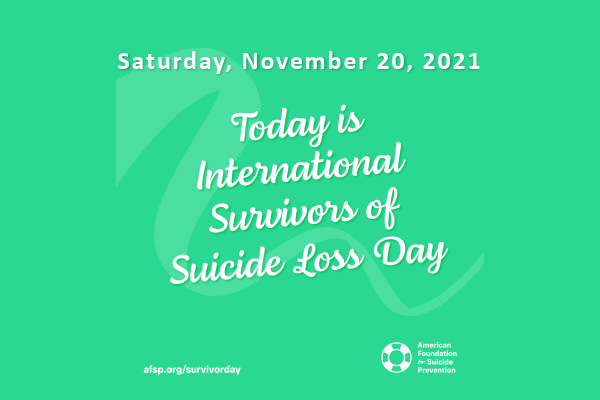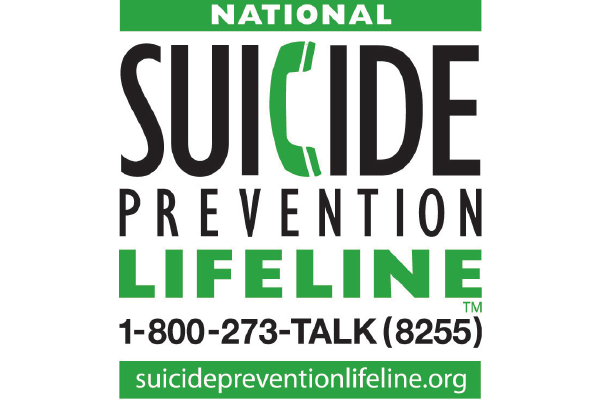Each Saturday before Thanksgiving each year is observed as International Survivors of Suicide Loss Day.
If you are having thoughts of suicide, call the National Suicide Prevention Lifeline at 1-800-273-8255 (TALK). You can find a list of additional resources at SpeakingOfSuicide.com/resources.
SUICIDE LOSS SUPPORT
The American Foundation for Suicide Prevention shares resources for survivors of suicide loss, including loss survivor stories and ‘Healing Conversations’ with volunteers who are themselves loss survivors. The AFSP operates a Massachusetts chapter, which is hosting multiple events on November 20th, below. (Find the AFSP’s 10 Reasons to Attend a Survivor Day Event here.)
-
International Survivors of Suicide Loss Day – Virtual LGBTQ Northeastern Division
-
International Survivors of Suicide Loss Day – Osterville, Massachusetts (MA)
-
International Survivors of Suicide Loss Day – American Sign Language (ASL) Only Virtual Event
The Samaritans offer local support for survivors of suicide loss year-round through their grief support services, including SafePlace meetings – which are free, ongoing, drop-in, and now virtual. The Samaritans also offer (virtual) Survivor to Survivor Visits and an annual You can find more on their grief services here.
We remind lawyers, law students, and judges in Massachusetts that you can discuss grief and any mental health concerns with a licensed therapist at LCL MA. Find more on scheduling here.
SUICIDE PREVENTION
Suicide prevention awareness efforts are working to overcome the hesitance many people continue to feel around talking about suicide. Even some who feel comfortable discussing other mental health topics might experience hesitation around addressing suicide specifically. The National Suicide Prevention Lifeline organizes #BeThe1To, a “message for National Suicide Prevention Month each September and beyond, which helps spread the word about actions we can all take to prevent suicide.” The American Foundation for Suicide Prevention’s message to #StopSuicide similarly encourages us not to be afraid to ask, and learn ways we can help and what resources are available. And the International Association for Suicide Prevention shares ‘Creating Hope Through Action’ as a reminder that “We all can reach in and ask somebody. You do not need to tell them what to do or have solutions, but simply making the time and space to listen to someone about their experiences of distress or suicidal thoughts can help. Small talk can save lives and create a sense of connection and hope in somebody who may be struggling.”
As we shared in a recent post on our blog, a moving video about the need for colleagues in the legal profession shares the stories of lawyers who have lost loved ones to suicide, lawyers who have had suicide attempts, and others affected by suicide in the legal profession. The compilation was produced by Texas Lawyers’ Assistance Program and Lawyers Concerned for Lawyers of Pennsylvania, lawyer assistance programs, like LCL | Mass LOMAP here in Massachusetts. LAPs have grown in each state structure and services vary by state, and always offer free and confidential support for individuals who are struggling, as well as for individuals who notice a colleague is struggling. The ABA’s directory of LAPs across the US is available here, and those in Massachusetts can find how to schedule with us here.
As the video illustrates, starting with an open-ended question, like ‘How are you?’ anytime we notice a colleague might be struggling can ultimately save a life. To build trust first, a new study from Stanford found that expressing an observation about someone else’s emotional state, e.g. “You look upset,” can help (a hat tip for finding and sharing to the Virginia Lawyers’ Wellness Initiative!). We need to notice changes in mood or behavior in our peers even with busy workloads, and it can help to make time in advance to familiarize ourselves with warning signs particularly for suicide, which include the following from LCL of Minnesota:
- Hopelessness
- Withdrawal
- Desperation
- Increased use of alcohol and other controlled substances
- Impulsiveness or high-risk behavior
- Loss of engagement or sense of humor
- Deterioration in functioning
And as the video discusses, asking about suicide specifically is the only way to know when someone is need of more urgent (and more sustained) support — and it doesn’t increase the likelihood of it happening. It’s common to hesitate to ask the direct question, whether in fear of sparking the idea or otherwise, but it’s often necessary, and the alternative is a heartbreaking one. The acronym ‘ALGEE’ from MentalHealthFirstAid.org can help us remember important action steps: Assess for risk; Listen nonjudgmentally; Give reassurance and information; Encourage appropriate professional help; Encourage self-help and other support; find more guidance on each step in this helpful article from the Virginia JLAP. As we prepare to ask about suicide directly, LCL MN offers the following guidance:
If you observe these disturbing behaviors, ask directly, but ask in a way that is true to you. “Have you thought of harming yourself? Are you in a lot of pain? Do you feel unsafe? Are you thinking of suicide?” Never ask in a way that suggests you need a “no” answer, such as “you’re not thinking about suicide, are you?” Asking directly allows the person to speak freely. If he says “no” and you are still concerned, rephrase it and ask again. Give a reason why you asked – the person who said no may be ready to change her answer if you ask again and show you care.
Using the Two-Ask Rule is a tip from lawyer and addiction recovery advocate Brian Cuban. “The Two Ask Rule is: (1) when you see someone who is struggling, ask them how they’re doing and (2) before the conversation ends, let the person know you’re available if they want to talk further,” as explained here on the 2Civility blog from the Illinois Supreme Court Commission on Professionalism, who featured Cuban as a speaker at their recent The Future Is Now Conference.
With well-being in the legal profession falling as of early 2021 and attorneys of color suffering the most, we all need to look out for our colleagues. Startling rates of contemplating suicide were highlighted in a recent article published on the 2Civility blog:
Notably, roughly 31% of Black lawyers said they have contemplated suicide during their legal career. This is a significant increase from the approximately 23% of Hispanic and Latino attorneys, 20% of Asian attorneys, and almost 19.4% of white attorneys who reported the same tendencies.
We admire the individuals speaking in the video and beyond, including Gavin Alexander, a leader in the Massachusetts legal profession, who has shared his experience in a guest series on Dan Lukasik’s Lawyers with Depression blog. Gavin’s story captures why this tragedy is too common, and also how preventable it is, but only if we talk about it.
RELATED:
International Survivors of Suicide Loss Day Documentaries (AFSP)
Books for Loss Survivors (AFSP)
How to Talk to a Suicide Loss Survivor (AFSP)
Supporting Lawyers: Suicide Prevention, Wellness, and Resources (Mass SJC Lawyers Well-Being Network Meeting Recording) Use passcode p8FZ!v!g — Rose Cheyette from the Samaritans begins at 19:30.
Suicide Prevention Resource Center
Trevor Project: Crisis intervention and suicide prevention services to lesbian, gay, bisexual, transgender, queer & questioning youth.
Zero Suicide: Quality improvement initiative for suicide prevention in health and behavioral care.
The Legal Burnout Solution: Suicide Awareness and Prevention (ABA GP Solo, September 2021)
Attorney Suicide: What Every Lawyer Needs to Know (ABA Journal, 2019)
Suicide Prevention: Every Lawyer’s Opportunity (Lawyers Concerned for Lawyers, Minnesota, 2020)
What to Do When You’re Concerned about a Lawyer or Law Student (LCL MA, 2019)
ABA Launches Anti-Stigma Campaign for the Legal Profession (LCL MA, 2019)
Lawyers with Depression: Dan Lukasik Publishes ‘True Stories’ Series (LCL MA, 2021)
Rep. Jamie Raskin on the Life and Legacy of His Son, Tommy Raskin (NPR, 2021)
Free & Confidential Consultations:
Lawyers, law students, and judges in Massachusetts can discuss concerns with a licensed therapist, law practice advisor, or both. Find more on scheduling here.
. . .
Annual posts under the same title published in previous years redirect here.




